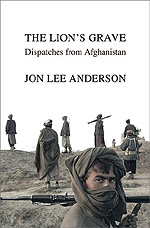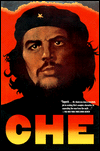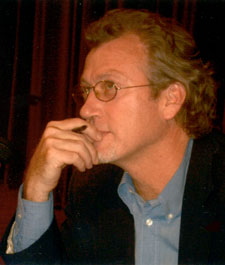NYS WRITERS INSTITUTE
HOME PAGE

 JON LEE ANDERSON
JON LEE ANDERSON
NYS Writers Institute, October 5, 2004
4:00 p.m. Seminar | Recital Hall, Performing Arts Center
8:00 p.m. Reading | Page Hall, 135 Western Ave., Downtown Campus
PROFILE
One of America's most respected foreign correspondents, Jon Lee Anderson is the author of "The Fall of Baghdad" (2004, ISBN 1594200343), an eyewitness account of the U.S.-led invasion of Iraq. The book follows a diverse group of Iraqis over the course of an extraordinary period of time: from the paranoia that prevailed under Saddam Hussein's brutal rule, to the surreal atmosphere of Baghdad before the invasion; to the invasion's commencement and the regime's collapse; to America's disastrously ill-conceived seizure of power.
 "a thoughtful document of war, written with stunning precision". . ."Anderson's unobtrusive voice mediates the voices of others faithfully and with humanizing integrity, resisting any impulse to convert what he observes into political argument. Instead, he collects grimly cinematic snapshots of Iraqi casualties that will haunt readers even after the invasion has receded into history." - "Publisher's Weekly" (starred review)
"a thoughtful document of war, written with stunning precision". . ."Anderson's unobtrusive voice mediates the voices of others faithfully and with humanizing integrity, resisting any impulse to convert what he observes into political argument. Instead, he collects grimly cinematic snapshots of Iraqi casualties that will haunt readers even after the invasion has receded into history." - "Publisher's Weekly" (starred review)
"Anderson's descriptions of the American "shock and awe" attacks on Baghdad are stunning. . .First-rate frontline reportage, full of luminous and eye-opening details." - "Kirkus Reviews" (starred review)
". . .A riveting look at the ill-conceived strategy to topple a dictator and reduce terrorism." - "Booklist Reviews"
Jon Lee Anderson is a staff writer for the "New Yorker" whose regular "Letters from Baghad" about the present Iraqi conflict have generated wide attention. The letters include not only firsthand reports of the violence and turmoil in that country (both before and after the war's end) but also provide the intelligently observed details, vivid language and unusual stories that have built Anderson's reputation as a "journalist's journalist."
 Anderson is also the author of "The Lion's Grave: Dispatches from Afghanistan" (2002), a riveting account of recent events in that war-ravaged country. Anderson was among the first few Western journalists to enter Afghanistan after 9/11. The book, which features diary entries, informed analysis, and straight reportage dispatched via laptop and satellite phone, provides rich accounts of wartime incidents (the fall of Kandahar, the search for the Tora Bora caves), while elucidating the ethnic and religious conflicts that continue to ravage the country, as well as the impact of U.S. intervention. Uniquely knowledgeable on the subject of Afghanistan, Anderson has reported on that country's politics and society since the Soviet-Afghan War.
Anderson is also the author of "The Lion's Grave: Dispatches from Afghanistan" (2002), a riveting account of recent events in that war-ravaged country. Anderson was among the first few Western journalists to enter Afghanistan after 9/11. The book, which features diary entries, informed analysis, and straight reportage dispatched via laptop and satellite phone, provides rich accounts of wartime incidents (the fall of Kandahar, the search for the Tora Bora caves), while elucidating the ethnic and religious conflicts that continue to ravage the country, as well as the impact of U.S. intervention. Uniquely knowledgeable on the subject of Afghanistan, Anderson has reported on that country's politics and society since the Soviet-Afghan War.
"… this book captures a time and a place that no one who reads it will forget…. For anyone tired of instant journalism, this book reflects an older art." - Frank Smith, in a rave review in the "Washington Post"
Anderson's 1992 book, "Guerillas," features conversations with members of five guerilla movements: Afghanistan's mujahedin, Burma's Karen movement, El Salvador's FMLN, the Polisario of Western Sahara, and the Palestinians of Gaza. "Library Journal" praised Anderson's ability to "draw insightful generalizations" about the widely disparate movements, and to "evoke the individual uniqueness" of each guerilla. 
"Che Guevara: A Revolutionary Life" (1997) is the book that established Anderson's reputation as one of the great foreign correspondents of his time. The monumental 800-page biography draws upon interviews with people who had never before spoken publicly, as well as previously secret documents from Cuban archives. The "Sunday Times" of London called the book, "a masterly and absorbing account…."
The son of a U.S. diplomat, Jon Lee Anderson was raised and educated in South Korea, Colombia, Taiwan, Indonesia, Liberia, England, and the United States.
 Speaking with Jon Lee Anderson
Speaking with Jon Lee Anderson
Author of
THE FALL OF BAGHDAD
(The Penguin Press; October 27,2004)
Your coverage of the Iraq War for the New Yorker is among the most respected. In
this book you're doing something different, however, yes?
I was a privileged observer of the violent fall of one of the most repressive regimes of
modem times. I witnessed the transformation not only of Iraq's capital, Baghdad, but of
its society, in a short period of time. It was a natural story with a beginning, a middle,
and a sort-of-end. One chapter--the dictatorship of Saddam Hussein--had ended, and a
new one--that of the American occupation of Iraq--had begun.
Iraq is an ongoing story, obviously, and one which grows increasingly complex over
time, but some of the keys to comprehending the present lie in the past. When, for
instance, things began to go wrong in Iraq for the Americans immediately after the fall of
Baghdad, I realized that much of what was occurring--the rise of an armed Iraqi
resistance--had long been anticipated by many of the Iraqis I knew, and yet still came
as a surprise to the American war planners. It seemed to me that this apparent gulf
between Iraqi and American comprehensions of the same reality was important for
Americans, particularly, to know. And there was something else, too: The lives of
everyone I knew in Iraq underwent dramatic transformations as a result of the war. I felt
that their stories were important and should be set down, because they portray the
consequences--in human terms--of the larger history that is still taking place.
You came to know a number of Iraqis quite well while you were in Baghdad.
Dr. Ala Bashir was one of the first people I met in 2000. An Iraqi plastic surgeon and
artist who was close to Saddam, Bashir was nonetheless friendly and intellectually
curious. He liked to exchange views and opinions, and did not mind when mine differed
from his. I found him a fascinating conundrum, because he seemed too intelligent a man
to be a defender of Saddam's brutal tyranny, and yet he did so repeatedly in our
conversations. As the war approached, our relationship deepened after he revealed his
true feelings about Saddam, which seemed not so dissimilar to my own. As someone well
known in Iraq, he used his clout to protect me by calling information ministry officials
when I needed visa renewals. Afterwards, they treated me more respectfully, knowing I
had a powerful friend. Through Ala Bashir, I also met his deputy, Dr. Waleed, a quiet
family man who labored in Bashir's shadow. We became better acquainted when
Baghdad fell and Bashir and Waleed's hospital, the Wasati, was threatened by looters. At
Waleed's request, I led a detachment of Marines to guard the hospital, and a couple of
days later, Waleed and I set off to look for Bashir, who had disappeared a week earlier
after receiving a summons from Saddam Hussein.
I also got to know Bashir's voluble and gregarious friend Samir Khairi during the war. At
his insistence, Bashir and I made frequent visits to his house for meals and to watch news
on his (forbidden to most people) satellite TV. Khairi was initially introduced to me as a
foreign ministry official, but by the time Baghdad had fallen I knew that he was actually
a long-serving intelligence agent. He candidly owned up to everything, at my
promptings, and we remained friendly. I think he saw me as something of a lifeline, a
potential interface with the new occupation authorities. Despite his past, Khairi saw
himself as a victim of Saddam, and had hopes of being useful to the Americans, but
things did not turn out that way. A couple of months after Saddam's ouster, the
Americans arrested him and held him in prison for seven months.
Farouk Salloum is a likeable man whom I got to know--as I did Bashir--on my first trip
to Iraq in 2000. Sensitive and highly literate, Farouk had nonetheless become trapped in
his role as Saddam's favorite poet. To a certain extent, he had become a kind of court
jester for the dictator. Farouk's personal tragedy did not inspire my contempt, however,
because of the discernable agony he felt over the bad choices he had made in life, and
because he struck me, in essence, as a good man.
I became friendly with Nasser Sadoun--an unassuming man with an illustrious family
history in Iraq--on my many comings and goings through Amman to Iraq. He has lived
in Jordan for many years in self-imposed exile. Nasser is a keen student of Iraq's history
and I instinctively trusted his perceptions. He predicted, correctly, for instance, a
calamitous outcome for the postwar American occupation of Iraq. I appreciate his calm,
reflective manner, his wisdom, and I look forward to sitting down and visiting with him
on my trips. Listening to Nasser, I am always reminded of the long sweep of history, and
this helps put things back in place for me.
Are you in contact with any of these friends now?
I'm in touch with most of the people I got to know before the war. Ala Bashir is now in
the Gulf emirate of Qatar, where he is painting and doing some plastic surgery, while his
family is living in England. I visited him there late last June, and he was hoping to figure
out some way that he could be with his family and still earn a living. He was not
planning to return to Iraq. I saw Samir Khairi in Amman last summer, as well. The fall
of Saddam had not been good for Khairi. He had been arrested by the Americans and
spent a traumatic seven months as a prisoner, before he was finally released last spring.
He emerged with his health broken. He then fled Iraq after he learned that, as a former
intelligence official, he was on a militia group's hit-list. I have also kept up with Dr.
Waleed, who is still in Baghdad, working at the Al Wasati hospital. I tried to locate
Farouk Salloumin the summer of 2004, but found it difficult. I heard that he was lying
low, avoiding public appearances, concerned about his safety. Many people in Baghdad
remember his close relationship to Saddam, and this makes him an assassination target. I
did not look up Karim, the barber, on my last trip, because the backstreets of Baghdad
had become too dangerous to move around in. I've kept up with Nasser Sadoun on my
stopovers in Amman. The last time I saw him, he told me that he had resisted the urge to
return to his homeland, which he has not seen since the early seventies. "His" Iraq was
gone, said Nasser, and he wasn't sure he wanted to see the new one.
Sabah AI-Taiee, your driver, was instrumental in getting you around Baghdad. Did
you become friends?
Sabah worked as my driver on my first trip to Iraq in 2000 and over the years since then
he and I developed a special relationship. Over time, we began to trust one another, and
Sabah introduced me to "his" Baghdad. We went to his favorite restaurants, to cut our
hair and have a shave together every week from his friend, the barber Karim, and Sabah
took me to his backstreet haunts to smoke narghila (waterpipe) and drink Turkish coffee.
During the war he stayed with me, and his wife, whom he called "Madame Sabah," sent
us meals she had cooked in their home. He woke me up with coffee every morning and
fretted over me and became something like my personal manservant. Two months after
the fall of Baghdad, however, I lost faith in Sabah's ability to cope with the rapidly
changing security environment. By the midsummer of 2003, it was dangerous to move
around in Baghdad, and especially so for Westerners, who had become targets of the Iraqi
insurgents. After a frightening experience one July morning in Sabah's car, when he got
us trapped in traffic between two gunmen and a getaway car, I decided that I needed to be
with someone who was more tuned in to the danger than Sabah. He had not learned to
change with the times as quickly as was needed. I had to choose safety over friendship. In
the end, I suppose, our relationship was another casualty of the war.
Was it difficult for you, as a journalist to move freely through Baghdad?
Before the war, journalists were officially encouraged to stay at the govemment-run
Hotel Rasheed, which was full of state security people, and although it was an awful
place, it seemed wisest to play along, so as not to arouse suspicions. We were banned
from using our satellite telephones there, however, although many of us did so
clandestinely. One reporter was caught and expelled from the country, while the rest of us
had friendly minders who warned us when the security men were planning raids.
Meanwhile, most of us quietly established fall-back alternatives by securing rooms in
other hotels around the city, on the assumption that the Rasheed, which was located near
Saddam's main palace complex, would become a dangerous place to remain in and that we
would be able to slip Saddam's security cordon in the chaos of the coming war. This
turned out to be a naive illusion. Once the bombing began, Saddam's security apparatus
assumed control of the Ministry of Information and we were told we could only stay at the
Rasheed and a handful of other govemment-run hotels. Warnings from the Pentagon that
the Rasheed was a "high-value target" caused a mass exodus of journalists to the
Palestine hotel, across the Tigris river from Saddam's palace. The Palestine and the
adjacent Sheraton became the only approved places for the journalists to stay, and the
Ministry of Information--which controlled our destinies via its staff of officials and
minders and security men--moved in with us. For some time the ban on using our
satfones in the hotels continued, however, and we had to use them surreptitiously, risking
arrest and possible expulsion from Iraq. The regime was trying to force journalists to
continue coming to the Ministry of Information to conduct all their communications as a
means of preventing it from being bombed; the ministry was known to be on the
Pentagon's target list. Once the ministry was bombed, the regime relented, and we were
finally able to use our satfones openly in the hotel.
What is a "minder"?
Before the fall of Saddam' s regime, our minders were our constant companions, imposed
on us officially by the Ministry of Information. They were required to inform on us and
to limit our movements. But most of them, as I and other reporters discovered over time,
were hapless apparatchiks, merely doing their jobs in order to survive within the system
--and in some cases, they became our protectors and even our friends. Some, like Salaar,
were privately opposed to Saddam Hussein, and hoping for a speedy downfall of his
regime. He began to reveal this side of himself to me the closer the Americans came to
Baghdad.
Did you, at any point, feel the same kind of fear as the Iraqi people?
During the American bombing of Baghdad, which lasted three weeks until U.S. troops
finally entered and took the city; it felt as though I was living on a great horizontal bulls-
eye inhabited by five million people. Bombs rained down from the sky all around us, and
I think everyone in the city shared the same existential fear of impending catastrophe. For
the most part, the bombs hit their targets, but sometimes they missed, killing civilians.
Journalistss were not exempt either, as was demonstrated by the attack on the Palestine
Hotel by American tanks the day before Baghdad fell, in which a couple of colleagues
were killed. Also, all of us--Iraqis and Westerners alike--anticipated a prolonged and
extremely bloody siege of Baghdad; we existed hour to hour in the expectation that there
was much worse to come. This created a fraternal atmosphere which broke down cultural
barriers and made nationalities irrelevant--we were all potential victims of the same
fate. Everyone hoped for the best but understood that destiny can be a random thing.
This might explain why, even after several terrible bombings in which Iraqi civilians
were killed, I never experienced any hostility by their surviving relatives, even though I
was American.
What are your impressions of Baghdad now?
I was back in Baghdad in June and July. It was an even more dangerous place to be, as a
Westerner, than it had been a couple of months earlier, and I came away with the dismal
expectation of more bloodshed to come. I fear there will be no peace as long as American
troops remain in Iraq, for their presence has spawned a culture of resistance. Baghdad is
no longer a capital city so much as it is an armed camp where little is certain except more
violence.
Additional Links:
Sunday Times Union Article
Letter from Iraq
For additional information, contact the Writers Institute at 518-442-5620 or online at https://www.albany.edu/writers-inst.